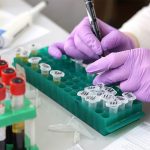 A specially trained individual who performs a wide range of complex and specialized procedures in all general areas of the clinical laboratory. An estimated 76,200 medical technologists were certified and active in 1973. Approximately two-thirds of all medical technologists are employed in hospital laboratories. Most others are employed in physicians’ private laboratories, clinics, the armed forces, city, State and Federal health agencies, industrial medical laboratories, pharmaceutical houses, and numerous public and private research programs. The minimum educational requirement for one of several certification programs in medical technology is, for example, a baccalaureate degree with appropriate science course requirements plus a 12-month structured AMA-approved medical technology program and an examination; or a baccalaureate degree with appropriate science course requirements and experience. The medical technologist is the most highly trained of several types of clinical laboratory personnel, including the medical laboratory technician, and medical laboratory assistant.
A specially trained individual who performs a wide range of complex and specialized procedures in all general areas of the clinical laboratory. An estimated 76,200 medical technologists were certified and active in 1973. Approximately two-thirds of all medical technologists are employed in hospital laboratories. Most others are employed in physicians’ private laboratories, clinics, the armed forces, city, State and Federal health agencies, industrial medical laboratories, pharmaceutical houses, and numerous public and private research programs. The minimum educational requirement for one of several certification programs in medical technology is, for example, a baccalaureate degree with appropriate science course requirements plus a 12-month structured AMA-approved medical technology program and an examination; or a baccalaureate degree with appropriate science course requirements and experience. The medical technologist is the most highly trained of several types of clinical laboratory personnel, including the medical laboratory technician, and medical laboratory assistant.
A person who performs chemical, microscope, and bacteriological examinations on human tissues, blood, and other specimens of or from the body. The medical technologist works under the supervision of a physician or other scientist, and typically has been trained in a medical technology training program (accreditation is available for such programs, but a person may be called an MT without having gone through an accredited program). An allied health professional for whom the American Medical Association’s Committee on Allied Health Education and Accreditation (CAHEA) has accredited education programs.
A technologist who works in conjunction with pathologists, physicians, and scientists in all general areas of the clinical laboratory. Independent and correlational judgments are made in a wide range of complex procedures. A medical technologist may teach and supervise laboratory personel.
